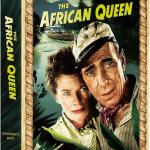Review of Lost in Thailand, Directed by Xu Zheng
If you know anything about the Chinese box office, you know that James Cameron’s Titanic and Avatar are among the highest grossing films—not to mention the incredible popularity of 2012. But who knew that low-budget comedy Lost in Thailand would rocket to the top of the box office when it opened in December 2012? By January 1, 2013, it passed the 1 billion yuan mark, beating the 3D release of Titanic. It sold more tickets than Avatar, but failed to rake in more money. Little known in the United States, Lost in Thailand is now a household name in the Middle Kingdom.
The first thing you notice about the film is that it reminds you of Due Date (2010). You have an odd couple—two men, one serious and business-minded and the other goofy and ridiculously oblivious to the problems of real life, who happen to be traveling together. The humor is light and fun and made Lost in Thailand a different animal from the more common martial arts epics that dominate China’s film industry.
Xu Lang has invented a solution that increases the volume of any liquid it is added to. He embarks on a journey to Thailand to find Lao Zhou, the company’s biggest shareholder, in order to get his authorization for more research funds, but Xu Lang’s co-worker Gao Bo has different ideas. Gao Bo wants to sell the invention to a French company, rather than continue developing the product, so he follows Xu Lang to Thailand and hopes to find the shareholder first to convince him of his own plan. Xu Lang meets Wang Bao, our jester, on the airplane ride to Bangkok. Wang Bao is journeying to Thailand to fulfill a bucket list and in a series of bizarre events Xu Lang and Wang Bo become partners—Xu Lang promises to help Wang Bo fulfill his bucket list while Wang Bo helps Xu Lang find the shareholder.
Lost in Thailand is a film that can elicit deep laughs even from American audiences who have no exposure to Chinese movies (or Chinese humor, for that matter). And as with most well-rounded comedies, there’s a good, fuzzy-feeling message at the end. Lost in Thailand continues this tradition and gives audiences the common moral message: don’t make life all about your career.
In the opening scene of Lost in Thailand, we see Xu Lang, fresh from his scientific discovery, arguing with his wife, who wants a divorce. Xu Lang has so devoted himself to his job that he has failed as a husband and as a father, and his wife has had enough. In Thailand, Xu Lang is willing to undertake excessively ridiculous things (sneaking into someone else’s hotel room, stealing vehicles, falling down into a ravine, being attacked by a Thai boxer, almost getting killed by Bangkok gangs), all for the sake of his job. In contrast, Wang Bao, the comedic sidekick, is in Thailand to plant a “life tree” on behalf of his mother, who has health complications. In the end, Xu Lang realizes that his job isn’t as important as spending time with his wife and child, while Wang Bo successfully plants a life tree near a Thai Buddhist temple.
Lost in Thailand is a helpful narrative to posit in the current Chinese cultural milieu, where career and possessions take precedent over time with family (note the distinction between time with family and family itself, since the family is admirably held in high regard in China). In his article “China’s generation gap”, British writer James Palmer studies the balinghou generation (those born after 1980) and examines the validity of common complaints that this generation is spoiled and more materialistic than their parents’. This article has been making waves among China bloggers and analysts. It is also normal to hear widespread acknowledgement among Chinese nationals of a “moral vacuum” in society, with an emphasis on selfishness and disregard for the common good.
In contrast, Lost in Thailand celebrates the sacrifice of professional success for the sake of personal relationships. Common grace allows Christians to affirm this positive strains in a world full of fallen societies and work toward the betterment and prosperity of all people. It also allows us to enjoy comedy as a gift from God to be appreciated. The plot of Lost in Thailand isn’t terribly complex and the characters are not very well developed, but the simple humor and themes will be delightful to many people.
It’s going to be hard to find a copy of Lost in Thailand in the United States. If you’re interested in the film and live in the D.C. area, I’d be happy to lend you my copy.













